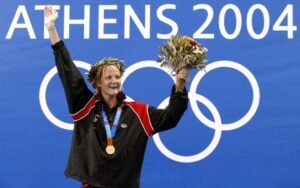Kirsty Coventry, a two-time Olympic gold medalist and Zimbabwe’s Minister of Youth, Sport, Arts, and Recreation, has made history as the first woman and the first African to be elected President of the International Olympic Committee (IOC). Her election marks a transformative moment for the 131-year-old organization, traditionally led by European men.
Coventry secured 49 of the 97 votes during the first round of the election held in Costa Navarino, Greece, defeating six other candidates, including IOC Vice President Juan Antonio Samaranch.
Her victory ushers in a new era for the Olympic movement as she takes over from Thomas Bach, who has led the IOC since 2013. Coventry will officially assume office on June 23, Olympic Day, beginning an eight-year term.
“The Olympic movement belongs to everyone, and I am honored to lead it into the future,” Coventry, 41, said during her acceptance speech, emphasizing the global and inclusive nature of her leadership.
From Champion to Leader
Born in Harare, Zimbabwe, Coventry emerged as one of Africa’s most decorated Olympians. She gained international fame at the 2004 Athens Olympics, winning three medals, including gold in the 200-meter backstroke. She repeated her victory in Beijing in 2008, ultimately earning seven Olympic medals and the title “Zimbabwe’s Golden Girl.”
Beyond her athletic achievements, Coventry has been a trailblazer in sports governance. She was elected to the IOC Athletes’ Commission in 2012, later serving as its chair. Since 2018, she has led Zimbabwe’s sports ministry, where she has been praised for improving infrastructure while facing criticism over athlete funding.
Leading the Future of the Olympics
Coventry assumes the presidency at a critical time. She will oversee the 2028 Los Angeles Games and the selection of the 2036 Olympic host city, while addressing financial and geopolitical challenges. Her historic election represents a step forward for gender equality within the Olympic movement, continuing the IOC’s commitment to increasing female representation under her predecessor.


